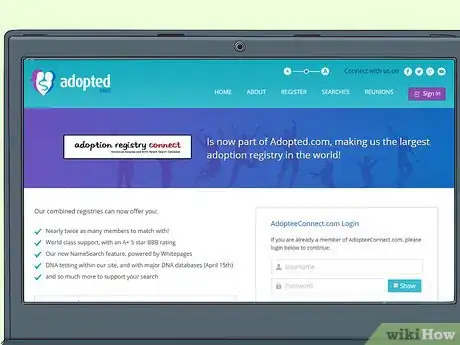This article was co-authored by Paul Chernyak, LPC. Paul Chernyak is a Licensed Professional Counselor in Chicago. He graduated from the American School of Professional Psychology in 2011.
There are 13 references cited in this article, which can be found at the bottom of the page.
This article has been viewed 167,623 times.
Fathers may be absent from their children's lives for many reasons. Sometimes, a breakdown in the relationship between the parents means that a father loses all contact with his child. In other cases, the relationship between a birth father and his child might have been severed by formal adoption. Perhaps you would now like to contact your father, or he would like to contact you. Preparing for the meeting can help ensure the best possible long-term outcome.
Steps
Finding Your Father
-
1Search for your father. If you want to initiate contact but do not know how to find your father, you will have to embark on a search. Realize that this search might take a long time and might not result in an actual meeting with your father.
-
2Research relevant state or national laws. If you were adopted, research the relevant laws governing your adoption records. You might be able to access an original birth certificate, for example, in order to obtain your father's name.[1]Advertisement
-
3Search adoption or reunion registries. These registries allow parents and adopted children interested in making a connection to post their information. The registries can then facilitate making contact.[2]
-
4Talk to relatives in order to assemble information about your father. Finding out where he worked or the names and addresses of his parents, for example, might be the first steps in finding current information about your father.
-
5
Deciding to Meet Your Father
-
1Decide whether you want to meet your father. The decision to seek contact can be motivated by many things, from wanting to learn family medical history to desiring a relationship.[7]
- If your father is the one initiating contact, remember that the decision rests with you, not with him or with your other relatives or friends. You may choose to hold on to his contact information for as long as you want in order to be ready for the encounter.
-
2Prepare yourself emotionally. You may want to read accounts written by other people who have reunited with an absent or unknown birth father. Support groups for adopted people may be helpful. You can also talk to your friends and relatives about your decision, though you should recognize that they may have their own feelings about the process as well.[8]
- Recognize that your father might not want to meet you, at least right away. Before you initiate contact, think about what it will be like if he refuses contact. Make a plan to reach out to specific people, such as supportive friends or a social worker, if this happens.
- Your father might react with surprise, fear, joy, or, most likely, a combination of emotions. Parents often carry significant guilt or even trauma related to children they've never met.[9] Recognize that your father's reactions are likely to evolve. Make sure that you can talk about your own feelings about his reactions with someone you trust.
-
3Think about what you hope to get out of meeting your father. Avoid fantasizing about your “ideal” father. What do you expect your father to be like, and how will you handle it if he is very different?
- It's more healthy to focus on getting answers to basic questions or filling in gaps in your knowledge about yourself than to dream about finding a perfect father.[10]
Meeting Your Father for the First Time
-
1Don't share too much too soon. In your early communication, you might choose not to share your full name, for example, or details about where you live and work. Although he's your father, he's also a stranger. He may also be reticent about sharing personal details right away.
- Try not to start an intense emotional relationship right away. A slow start has been shown to lead to better, more stable long-term outcomes.[11]
- You might choose to start by exchanging e-mails, messages, or letters before you meet. This can provide a slower, more measured method of beginning to get to know your father.
-
2Arrange a meeting with your father. Two hours is a good length for an initial meeting. Choose a neutral, relatively quiet location, such as a park bench or a calm café during daylight hours, where the two of you can speak to one another easily and express emotion.[12]
- It's up to you whether to meet with your father alone or ask someone else to come along. Some state and national governments offer an intermediary service, so that you have have a social worker present to mediate your first meeting.[13]
-
3Ask questions. This meeting is a chance for you to get answers to questions about your own identity. You might want to plan to ask some questions about your father's life or about your paternal family.
- For example, you might say: “I seem be the only one in my family who loves math. Do you like math, too? Did I get that from your side of the family?”
- Make sure to ask any health-related questions that are important for you. This is a good opportunity to find out about any genetic risks you may carry for things like heart disease, diabetes, or cancer.
- Notice what you share. It's normal to spend time at this first meeting noticing physical similarities between you and your father.[14]
-
4Don't make grand plans for the future. An initial meeting is likely to be very emotional. You may be surprised by what you feel, and so may he. You both need time to reflect on the meeting and think over what you would like to do next.
- If your father wants to think about the future, you might suggest something small but concrete. For example, you could set up a time to get a cup of coffee and talk again in a few weeks.
-
5Set up a support system for yourself. Make sure that the people who love you know about your meeting with your father. Plan what you will do immediately after the meeting and for the rest of the day. For example, you might plan to call one friend and have dinner with another. Don't plan to return immediately to work or school. If you are seeing a therapist or counselor, or working with a social worker, schedule a meeting or telephone call to debrief.
Developing a Long-Term Plan
-
1Don't let a disappointing first meeting define the relationship. If your first meeting was disappointing, it can still be worthwhile to maintain contact. Keep trying to get to know one another. There is no set script for reunions, and it can be a very challenging experience for both fathers and children.
-
2Recognize that there may be a “honeymoon” phase. A good first meeting can lead to euphoria and a sense of immediate, intense connection. This sense of connection will not last, at least at this level of intensity. You or your father may need to pull back and reassess as the reality of who you are sinks in.[15] Be ready to take a “time out” to sort through conflicting, confusing feelings and adjust the relationship. This is a normal part of the reunion process.
-
3Establish limits about each other's lives.[16] Beginning with minimal expectations can help you both to build a stronger, more enduring relationship. You may need to take the lead in establishing those limits, because parents often bring greater expectations to reunions than children do.[17]
- For example, if you have children of your own, you might wait until you have gotten to know your father better before you introduce them to him.
- Be clear about what kinds of contact are welcome, and what kinds aren't. Perhaps you would like him to call before stopping by, even if you happen to live close by to each other. Or perhaps you would rather have a scheduled telephone call instead of a more casual relationship in which it's ok to call or text anytime.
-
4Allow time for the relationship to develop. Any relationship needs time and space to evolve and deepen.[18] If you and your father are both interested in staying connected, look for ways to spend low-key time together. You could schedule a monthly lunch or telephone call, for example, or attend sports or music events occasionally together.
-
5Accept the relationship may not deepen or may not last.[19] Although reconnection often carries great benefits, some people find that they do not want a lasting relationship with their father after all. Perhaps your values or lifestyles are too different, or perhaps he is not capable of maintaining a healthy relationship with you.
-
6Don't neglect your childhood family. Continue to maintain the good family relationships that you already have. The people who raised you might appreciate reassurance that, although you are meeting your father, you still value their unique place in your life.
References
- ↑ https://www.childwelfare.gov/topics/systemwide/laws-policies/statutes/infoaccessap/
- ↑ http://www.adopteeconnect.com/
- ↑ http://www.theatlantic.com/sexes/archive/2013/04/adoptees-shouldnt-have-to-use-facebook-to-find-their-birth-parents/275251/
- ↑ https://www.childwelfare.gov/pubPDFs/f_search.pdf#page=11&view=Social%20Media%20and%20Searching
- ↑ http://www.iscsearch.com/
- ↑ http://reunion.adoption.com/adoption-records/search-angels.html
- ↑ https://www.childwelfare.gov/pubPDFs/f_search.pdf#page=2&view=The%20Decision%20to%20Search
- ↑ https://www.childwelfare.gov/pubPDFs/f_search.pdf#page=2&view=The%20Decision%20to%20Search
- ↑ http://www.abc.net.au/news/2016-02-29/adoption-counselling-service-visits-canberra/7206878
- ↑ http://www.cnn.com/2011/HEALTH/02/01/finding.parents.siblings.oprah/
- ↑ https://www.childwelfare.gov/pubPDFs/f_search.pdf#page=2&view=The%20Decision%20to%20Search
- ↑ http://www.originscanada.org/services/adoption-reunion/stages-of-reunion
- ↑ http://www.originscanada.org/services/adoption-reunion/stages-of-reunion/
- ↑ http://www.originscanada.org/services/adoption-reunion/stages-of-reunion/
- ↑ http://www.originscanada.org/services/adoption-reunion/stages-of-reunion/
- ↑ https://www.childwelfare.gov/pubPDFs/f_search.pdf#page=2&view=The%20Decision%20to%20Search
- ↑ http://www.theguardian.com/lifeandstyle/2012/dec/29/adoption-reunions-road-gets-bumpy
- ↑ http://www.cnn.com/2011/HEALTH/02/01/finding.parents.siblings.oprah/
- ↑ http://www.theguardian.com/lifeandstyle/2012/dec/29/adoption-reunions-road-gets-bumpy
About This Article
Contacting and meeting a father you’ve never met can be nerve-wracking and emotional, but if you manage your expectations and take things slowly, it should be a calmer experience. If you need help finding your estranged father, try asking relatives if they know anything about his situation. If you’re adopted, search adoption registries and social media for him. You can also hire a private investigator to help track him down. Once you’ve made first contact, try to take things slowly. It’s natural to feel excited and anxious, but don’t expect your whole life to turn around with one meeting. Try hanging out in a neutral location, like a coffee shop or park, for a couple of hours. This will give you a chance to ask any questions you have about your upbringing and your father’s side of the family. For more tips from our co-author, including how to decide whether to meet your father or not, read on.
















































































